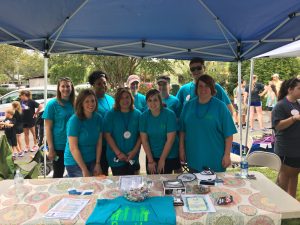
By Jamon Smith
When Charlie Morris graduated from Robertsdale High School in Baldwin County, Alabama, in 2005, he would have never guessed that one day he would return home to open the region’s first clinic focusing exclusively on juveniles with mental health issues.
But last year, that’s exactly what happened.
Bayside Behavioral Center officially opened Aug. 1, 2016, and in its first year it experienced a 166 percent net revenue increase and reached a total of more than 500 active clients.
“We see ourselves no different than any other pediatric medical practice,” said Morris, founder and director of Bayside. “People don’t have a stigma about any other medical conditions like diabetes, so they shouldn’t about mental illness.”
“I’ve known my entire life that I was meant to change the world,” said Charlie Morris.
Morris, age 30, said the majority of Bayside’s clients are between the ages of 13 and 19, and are most commonly treated for issues such as anxiety, depression and trauma-related issues.
The clinic has three main outpatient programs: general mental health, the Community Autism Intervention Program (CAIP) and the sexuality and gender program.
CAIP uses research and evidence-based practices to assess, diagnose and treat youth with autism spectrum disorders.
The sexuality and gender program is split into two subprograms called the Problematic Sexual Behavior Program (PSB) and the Dandelion Project.
PSB serves youth with problematic sexual behaviors that cause a disruption in their lives.
“About half of the kids in PSB have been sexually abused,” Morris said. “The other half have issues with control and power because they feel like they’ve never been in control, so they exercise it on other people.”
The Dandelion Project provides individual counseling, family counseling, support groups and community resources for LGBTQ youth and their families.
Youth who identify as LGBTQ are two to four times more likely to commit suicide than other youth, 20 to 40 percent more likely to be homeless, and 14-31 percent more likely to be a victim of dating violence, according to the Centers for Disease Control and Prevention.
“The suicide rates are higher with LGBTQ kids because of the prevalence of untreated mental health issues,” Morris said. “This combined with ostracism from their families and communities, is often deadly.
“Being in one of the most conservative counties in the nation, we catch a lot of backlash here at Bayside. People often tell us we’re doing the devil’s work by helping kids who identify as trans or gay. I block out that negativity by focusing on the quality of care we provide. As long as we continue to use evidence-based treatment, that’s all I care about.”
Life Before the Clinic
When Morris left Summerdale, he initially attended the University of Montevallo. Two years later in 2007, he transferred to The University of Alabama where he graduated with a bachelor’s degree in social work in 2009, and a master’s degree in social work in 2012.
“I chose UA for a lot of reasons, but primarily for their social work program. I loved every moment I ever spent on UA’s campus. I joined Phi Beta Sigma there, which is a (predominantly) African-American fraternity, and I was able to develop different student chapters within the social program that are still standing today like the North American Association for Christians in Social Work.”
Morris said if it were not for the faculty at UA, particularly Dr. Cassandra Simon and Joanne Terrell, he would not be where he is today.
“The first thing Cassie said to my class when I first met her is, ‘I stand up for what I believe in, even if I’m the only one standing.’ She taught me that social workers deal with the outcast, the forgotten and the parts of society that everyone wants to forget. And if we don’t stand up for them, no one will.”
After graduating from UA with his master’s, Morris worked in Phoenix, Birmingham and cities in Tennessee. It was in Phoenix that he became a licensed psychotherapist working for the Youth Services Institute.

He moved back to Baldwin County to help his family in 2015, taking a job with the Alabama Department of Human Resources. But when county leaders found out he had returned to the area, they asked him to provide juvenile services to Baldwin County because the services there weren’t sufficient.
“Initially, I started out by myself providing services, and it quickly grew because there was a large amount of referrals so I started a behavioral health clinic,” he said. “Our juvenile justice system really pushed me because they knew the caliber of work I did and how much I cared, so they put a lot of pressure on me to follow through.”
Once Bayside opened, referrals from the juvenile justice system, medical community and eventually the school system came fast and furious. A year later, his clientele list continues to rapidly grow.
“I’ve known my entire life that I was meant to change the world,” he said. “That sounds egotistical, but it comes from a servant’s heart. I’m big on being a servant. As I got older, I realized that changing the world is changing the world of an individual, particularly children who are often forgotten.
“We give them a voice and teach them to advocate for themselves, to manage their mental state.”
